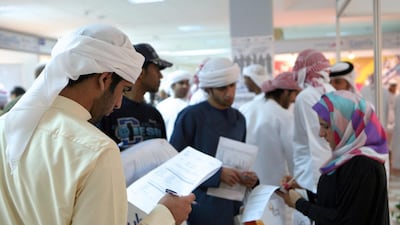In the United Kingdom, one of the statistics most followed by sociologists, politicians and economists are those involving people aged 16 to 24 not engaged in education, employment or training (Neets).
Although the trend is downwards, there were still 843,000 so-called Neets in the UK at the last count, amounting to 11.3 per cent of all young people.
The Neet index is a vital indicator of just how well youth are being integrated into their country’s socio-economic narrative.
Neets for the most part exist outside those all important institutional touchpoints that weave coming generations into the fabric of mainstream society. Most Neets exist in sociological bubbles – unproductive, underdeveloped, under appreciated and in many cases they are disillusioned and apathetic. In the Arab world the number of young people is extremely high as a proportion of total population and is growing every year. Coupled with this, Arab youth unemployment – already the highest in any region pre-Arab Spring – is now reckoned to be 30 per cent.
The 2011 uprisings should not be allowed to cement in the minds of regional governments the notion that young people are a liability. They should be seen rather as vehicles for diversification, reform and optimism. They must be shown new pathways to self-determination in a region that has been held back too long by the excesses of big-state command economics.
Shamma Al Mazrui, the Minister of State for Youth Affairs, was succinct when speaking on an Atlantic Council think tank panel last week on the need to engage youth.
“If there is a gap between government leadership and their youth, if governments do not value their youths sufficiently and are not connected to their true needs, ideas and concerns [and] if governments don’t create authentic, credible channels to connect to their youth, this creates a vacuum of unempowered youths who will follow different paths,” she said.
This “different path” might not necessarily be extremism, though the recent Arab Youth Survey did reveal a significant leaning (13 per cent) towards a less-violent version of ISIL, whatever that may mean.
In the wealthier Arab states, where a basic social safety net is all but guaranteed, the “different path” might be alienation, economic and social dislocation leading, in the end, to a fundamental rupture with the aims and imperatives of a developing economy and society.
The UAE needs all of its workforce to fuel development. Young people as a whole also make up more than half of the total Emirati population. Indeed, the increasing dominance of women both in the graduate pool and in the workforce is as much a result of economic necessity as of social engineering born from abstract principles governing female empowerment.
Shrinking government budgets and the increasing complexity of a diversified economy make the integration of Emirati youth into the economic and social mainstream all the more important. The Government’s first duty is towards its people and the need to ensure the transfer of knowledge and capacity and, in the end, real jobs, to Emiratis.
But the responsibility is not all on the Government’s side. Many young people in safe, more-affluent societies are quick to adopt the language of disempowerment at the hands of remote political “elites” without truly considering their own duty towards self-determination.
In the recent Brexit referendum in the UK 75 per cent of youth who voted, wanted to remain. The subsequent result was thus characterised as a gross betrayal of the young by an ageing, self-interested establishment. Then it emerged that only 64 per cent of youth entitled to vote had actually bothered to do so, compared with 90 per cent of the over-65s.
We have also witnessed relatively low turnouts for elections to the UAE’s Federal National Council which, despite criticism by external observers, represents an important evolutionary step in political participation and public scrutiny of government policy.
As Ms Al Mazrui said, government has a duty to connect with youth. But it must also work towards an understanding that its generous social contract is a two-way street, conferring rights but inviting participation in return. Low oil prices have acted as boosters to necessary reforms, in education, in vocational training and placements and in efforts to shrink the public sector and open up private sector opportunities for young people properly trained in the knowledge economy.
Increasingly in the UAE, as with neighbouring Saudi Arabia, the focus for employees, as well as for graduates entering the workforce, is on productivity over entitlement.
Perhaps the clearest sign of the Government’s intention of rebalancing the relationship between the state and citizens was the introduction of compulsory military service. This was important for building up a credible defence force in an increasingly troubled region, but it also throws a net over successive generations at a critical stage in their lives, serving as a reminder that the rights and comforts conferred on citizens are clear invitations to subsequent participation in the country’s future.
Martin Newland is a former editor in chief of The National

